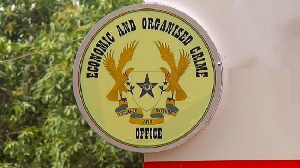Accra, April 13, GNA - The Centre for Democratic Development (CDD) on Thursday lashed at Parliament for failing to assert itself on the performance of state enterprises and especially on the transactions on the Ghana Airways that metamorphosed into Ghana International Airline {GIA) and the government soiling its fingers in the process.
It said the GIA episode "reveals the utter failure of Parliament to assert its proper oversight role in the area of state enterprises and the governance costs of parliament's inaction in this area." A statement Professor E. Gyimah-Boadi, Executive Director of CDD signed on "CDD reaction to the Chief of Staff/Ghana International Airlines Saga" said, "it is not clear if Parliament deliberated upon and pre-approval GIA deal.
It said, "The episode highlights the consequences and implications of Government's failure to heed calls for transparency in its handling of certain maters affecting the public interest.
"From the very beginning, there has been very little transparency about how GIA came into being... There has been inadequate transparency about the nature of the relationship between government and GIA as well as the nature and extent of the respective interests of the parties, including the capital and governance structure and other terms of the GIA agreement (if there is any such agreement).
"Government should have been sensitive, from the very beginning, to the public's need for utmost transparency in the transaction, especially in the light of the fact that GIA was supposed to replace the failed national carrier, Ghana Airways, which was dogged by serious governance issues."
The statement said, "As an organisation committed to the promotion of good governance, the rule of law, and integrity in public administration, it was deeply troubled by the recent development involving the Chief of Staff and the management of the Ghana International Airlines (GIA), and specifically its governance implications.
"It also demonstrates the utter failure of the New Patriotic Party (NPP) administration to change the culture of corporate government relating to Ghana's state enterprises and enterprises in which the State has an equity interest."
The Government was expected to design policies and programmes that would reform corporate governance in our state enterprises. It was expected to have moved away from the longstanding politicisation of the management of these enterprises. It was expected to have introduced and institutionalised a system of management of public enterprises characterized by professionalism, meritocracy and proper accountability of their management to institutions of state such as parliament and the Auditor General, especially in the light of this government's early avowal of a commitment to ushering Ghana into a Golden Age of Business. The CDD said, "Instead, what we see is a deepening of the same old dysfunctional system and political culture in which politicians routinely intrude into the day-to-day management of state commercial enterprises, with disastrous consequences for profitability and effective public accountability."
"The episode also reveals the dubious merit of trying to fix every problem by appointing a Minister or creating a Ministry to be in charge of it.
"What is the point of separating out the Aviation portfolio from the Transportation Ministry and putting at the head of it the President's Chief of Staff and Minister of Presidential Affairs, particularly when the national aviation portfolio has only a rather modest asset base?", the CDD asked.
It said the unfortunate reality was that once there a Minister in-charge of Aviation, "he will be inclined to find something to do." The CDD said "given our political and corporate governance culture, the tendency would be, as we now seem to see for the minister/ministry to inject himself directly into the operations of the airline." It also raises worrying questions about the depth of the government's commitment to a rule of law ethic.
The CDD said, "The Chief of Staff/GIA saga, even with the after-the-fact efforts to assign responsibility for the announced management changes to the board of GIA, still leaves disturbing marks of decision making based on subjective and personality related factors, rather than in accordance with pre-determined rules and procedures." At this stage in Ghana's democratic and constitutional evolution, one would have expected that such exercise of personal rule and management by crisis would be a thing of the past, giving way to the rule of law and more deliberate and thoughtful planning. The CDD said it was not clear what degree of oversight Parliament had been exercising over the commercial and quasi-commercial business ventures of government.
For instance, there is a Parliament Committee specifically charged with the oversight of state enterprises. Yet, in all of the problems we have experienced with state enterprises from the bankruptcy and collapse of Ghana Airways to the debt problems of TOR not once have we heard the Parliamentary Committee on state enterprises play any role in trying to get to the bottom of the problems that have afflicted these state enterprises and cost the government and taxpayers billions of cedis in scarce resources.
The CDD said, "Curiously, MPs, who are supposed to hold their state enterprises and the executive accountable for the judicious use of public funds, usually join the public chorus in calling on government to take this or that action, suggesting that the MPs do not deem themselves empowered to act on their own initiative.
The reported involvement of senior ruling party figures in the Chief of Staff/GIA saga, ranging form Mr Sam Crabbe who doubles as the GIA corporate affairs vice president and an executive within the NPP as well as other NPP executives raises disturbing questions about the lack of separation between the business of the state/government and the business of the ruling party as well as some of its leading personalities.
The CDD said, "This highlights the persistence in Ghana of the neo patrimonial form of governance that has proved consistently inimical to sustained democratic and economic development." 13 April 06
General News of Thursday, 13 April 2006
Source: GNA












